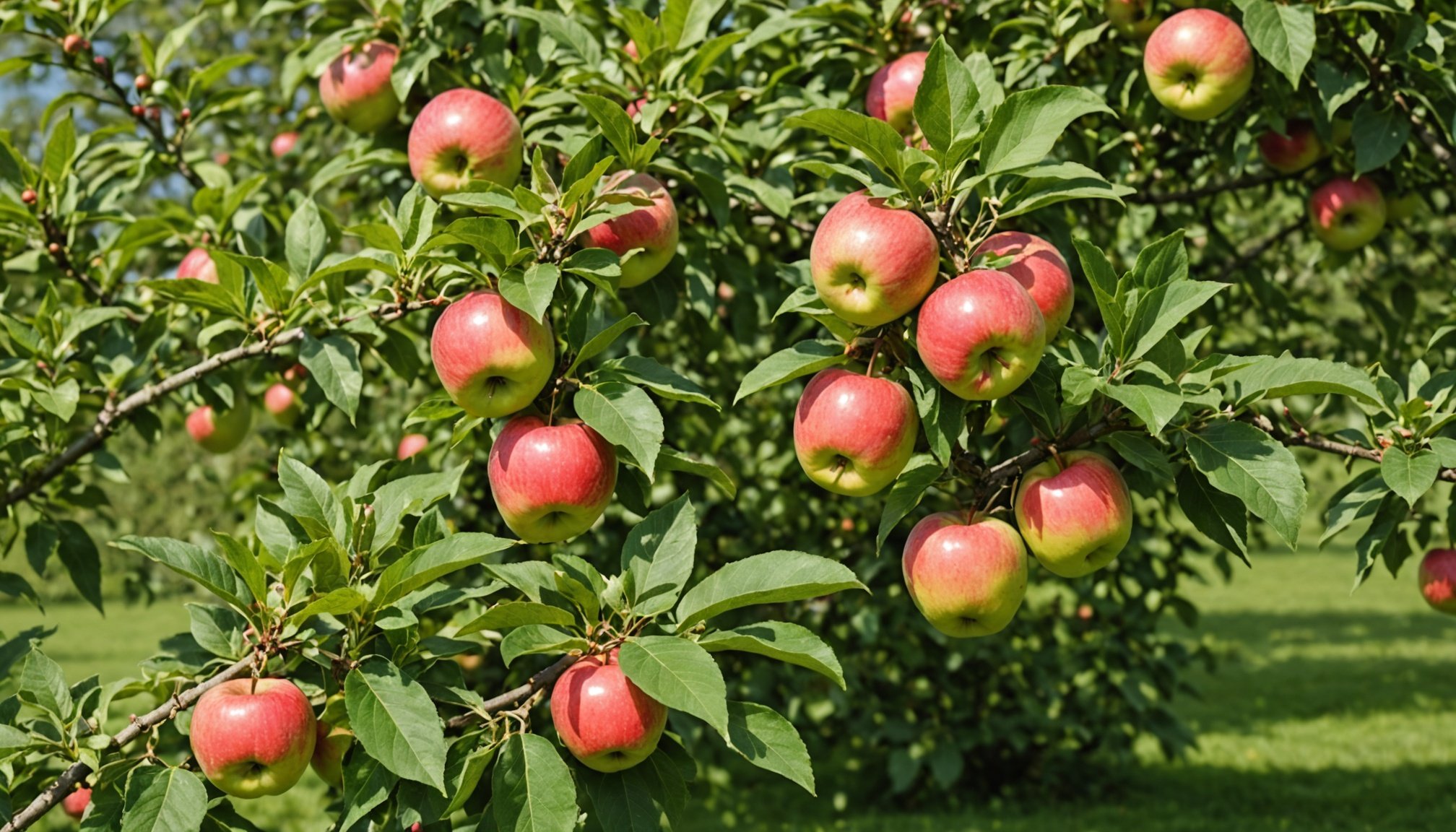Introduction to Companion Planting for Apple Trees
In the fascinating world of gardening, companion planting stands out as a technique that not only enhances growth but also bolsters the health of plants. By strategically placing plants close to each other, especially around apple trees, this method can yield numerous advantages. Unlike traditional planting strategies, companion planting pivots on the idea of natural symbiosis—leveraging the strengths and protective abilities of different plant species.
Apple trees, with their temperamental nature, require specific care to thrive. In addition to sunlight and water, these trees favour certain soil conditions and benefit from protective environments that deter pests. In areas such as the South-East UK, where the climate presents unique challenges, companion planting becomes a vital technique. By choosing the right companions, gardeners can address issues like nutrient needs and pest control naturally.
Sujet a lire : Maximizing Vertical Spaces: Top Strategies for Urban Gardening Success in the UK
What are the tangible benefits of implementing this approach? For apple trees, companion planting can mean improved fruit quality, enhanced resilience against diseases, and decreased dependency on synthetic chemicals. This not only promotes a healthier garden but also supports the environment by reducing chemical runoff. Understanding the dynamic interactions between plants is a rewarding journey, offering both novice and experienced gardeners a chance to enrich their apple-growing practices.
Recommended Companion Plants for Apple Trees
Planting companion plants around apple trees can significantly enhance apple tree growth and pest control. Certain plants possess unique characteristics that make them ideal partners for apple trees.
A voir aussi : Unlocking the Secrets: Effective Strategies to Enhance Crop Rotation Advantages in Your UK Garden
1. Garlic and Chives: These aromatic plants are exceptional at repelling pests like aphids and moths. They also enhance the flavour of apples while improving the tree’s resistance to disease.
2. Nasturtiums: Known for their vibrant blooms, nasturtiums lure aphids away from apple trees, contributing to effective pest control. Their ability to attract pollinators further promotes apple tree growth.
3. Comfrey: This deep-rooted plant helps to improve the nutrient content of the soil by drawing minerals from deep within. These nutrients are then absorbed by the apple trees, boosting their overall health and yield.
4. Clover: With its nitrogen-fixing capabilities, clover enriches the soil, promoting more vigorous apple tree growth. Moreover, it serves as a living mulch, retaining soil moisture and stifling weed growth.
When choosing companion plants, it is vital to recognise these pest control and growth-promoting benefits. Incorporating suitable companion plants in your orchard can lead to healthier apple trees, richer harvests, and naturally reduced pest-related issues.
Enhancing Soil Health with Companion Planting
Improving soil health is crucial for productive gardening. One highly effective method to achieve this involves companion planting. It plays an essential role in nutrient enhancement and offers added benefits for plants like apple trees.
Companion plants like legumes perform remarkable tasks for soil improvement. These nitrogen-fixing plants have a unique ability to convert atmospheric nitrogen into a usable form for other plants. The process happens through their symbiotic relationship with soil bacteria, enhancing soil fertility and benefiting neighbouring plants. Using legumes can create a flourishing environment around your apple trees.
Selecting the right companion plants is key to optimizing soil health. Here are some gardening tips for choosing plants:
- Opt for leguminous plants, like clover or alfalfa, which boost soil nutrients through nitrogen fixation.
- Consider planting herbs such as comfrey, which can mine nutrients from the deep soil layers, making them available to apple tree roots.
- Use a mix of plants with differing root systems and nutrient requirements to avoid nutrient competition and foster a balanced ecosystem.
By thoughtfully integrating companion plants, your garden can thrive with enriched soil, leading to healthy and bountiful apple tree harvests.
Climate Considerations for Apple Trees in the South-East UK
Understanding how the South-East UK climate affects apple tree growth is crucial for successful gardening endeavours. The region is known for its relatively mild and wet climate, which can both benefit and challenge apple tree cultivation. Mild winters help in preventing frost damage to blossoms, while extended wet periods may increase the risk of fungal diseases.
For optimal growth, selecting the right gardening strategies is essential. It is advisable to choose disease-resistant apple varieties. Trees should be planted in well-draining soil to avoid waterlogging, which is prevalent due to heavy rainfall. Additionally, implementing regular pruning ensures better air circulation, thus reducing the likelihood of diseases.
The selection of companion plants can also be influential. Marigolds and nasturtiums are excellent choices that thrive in the local climate while also repelling pests. Herbaceous plants like chives and garlic can contribute to a natural pest barrier, protecting your apple trees from aphids and beetles.
Thoughtfully considering these climate factors and employing appropriate gardening methods can significantly increase the success rate of apple tree cultivation in the South-East UK, while allowing for a more sustainable and environmentally friendly approach to gardening.
Practical Gardening Tips for Growing Apple Trees with Companions
When it comes to achieving a flourishing apple tree orchard, companion planting can be an invaluable strategy. Integrating the right plants not only enhances growth but also aids in apple tree care. Understanding the symbiotic relationships between apple trees and their companion plants can elevate your gardening strategies.
Companion Planting Tips
One way to maximize your apple tree’s potential is to plant lavender, garlic, or chives nearby. These companion plants deter pests that often plague apple orchards, offering natural protection. For gardeners aiming to support pollination, flowering herbs like mint or dill can attract beneficial insects.
Maintenance Strategies
Consistent maintenance is key to healthy apple trees. Pruning, as needed, ensures that both the apple trees and companion plants receive adequate sunlight. Regularly check soil moisture to keep companion plants thriving, as they can influence the tree’s root health.
Seasonal Considerations
Planting in early spring allows companion plants to establish before apple blossoms fully develop. This timing can optimize nutrient sharing. Harvesting companion plants like herbs before winter can prevent overcompetition for resources.
By thoughtfully integrating companion plants, you enhance your garden’s ecosystem, promoting healthier apple trees and a more fruitful harvest.
Local Resources and Community Insights
Connecting with local gardening resources is essential for those looking to enhance their apple tree cultivation. Across various regions, local nurseries and gardening clubs offer specialized expertise. Many nurseries focus specifically on apple tree care, providing region-specific advice, seedlings, and maintenance products. These establishments often host workshops, offering community members access to hands-on learning experiences.
In addition to nurseries, community gardening groups are invaluable. By joining a local gardening club, you can gain insights from experienced gardeners who have found success in companion planting with apple trees. These community members often share tips on pest management, soil compatibility, and seasonal care, tailored to local climate and soil conditions. Such first-hand experiences provide practical knowledge that can enhance your gardening techniques.
Furthermore, attending regional gardening workshops and resources can offer comprehensive learning opportunities. These events typically cover a range of topics, from basic apple tree care to advanced practices in organic gardening. Engaging with these resources not only broadens your understanding but builds connections with other gardening enthusiasts. Being part of such a network can also yield unexpected benefits, like equipment sharing or co-operative purchasing. Engaging with local resources offers a wealth of information, essential for both novice and experienced gardeners alike.






